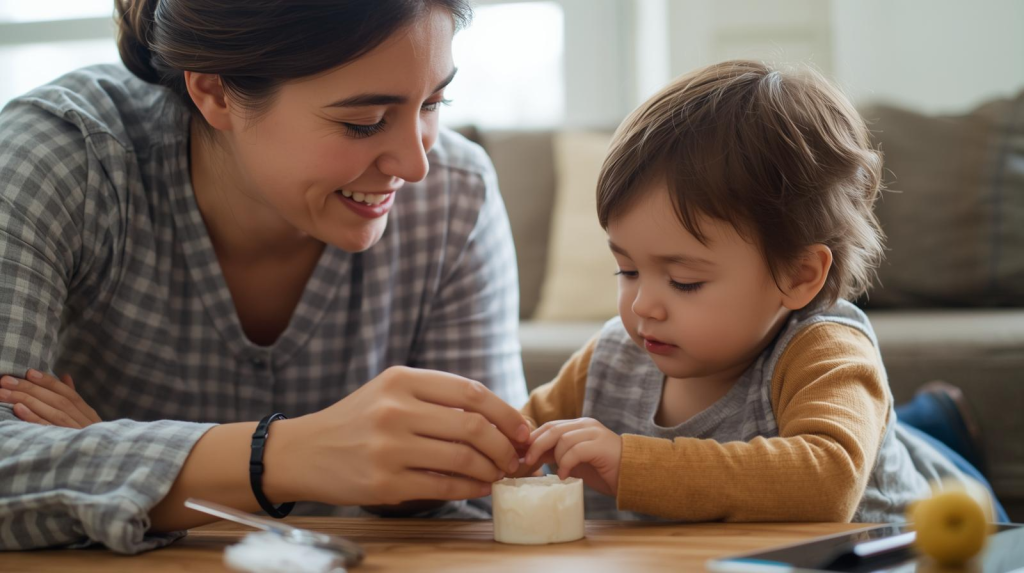Explore simple yet powerful rituals that can deepen your parenting connection and create lasting family bonds.

In the whirlwind of daily life, parents often find themselves juggling responsibilities, leaving little time for meaningful interactions with their children. Mini rituals can serve as a lifeline, offering moments of connection that foster trust and emotional security. By incorporating small, consistent practices into your routine, you can create a nurturing environment that strengthens your relationship with your kids. These rituals not only enhance bonding but also promote a sense of belonging and joy within the family.
Key Takeaway
- Mini rituals create opportunities for meaningful interactions that strengthen parent-child bonds.
- Consistent routines foster emotional security and predictability for children.
- Simple daily practices can significantly reduce parenting stress and enhance family connections.
The Importance of Rituals in Parenting
Rituals are more than just routines; they are intentional practices that cultivate connection and trust. In parenting, these mini rituals can take various forms, from bedtime stories to family meals. They provide a framework for emotional engagement, allowing parents and children to share experiences that reinforce their relationship.
When parents prioritize these moments, they create a safe space for children to express themselves, fostering a sense of belonging. This is particularly crucial in a world where distractions abound. By being present during these rituals, parents can strengthen their emotional connection with their children.
Daily Parenting Rituals

Establishing daily rituals can be a game changer for families. These rituals don’t have to be elaborate; simplicity often holds the most power. Here are some ideas:
Morning Check-Ins
Starting the day with a brief check-in can set a positive tone. A simple question like, “What are you looking forward to today?” can open the door for meaningful conversation. This practice not only encourages children to share their thoughts but also shows them that their feelings matter.
Mealtime Connection Moments
Family meals are an excellent opportunity for connection. Instead of rushing through dinner, take a moment to share highlights from the day. This ritual can be as simple as going around the table and sharing one good thing that happened. It fosters gratitude and encourages children to reflect on their experiences.
Bedtime Parenting Rituals
Bedtime can be a magical time for connection. Reading a story together or sharing thoughts about the day can create a calming atmosphere. This ritual not only helps children wind down but also reinforces the bond between parent and child.
Creating Meaningful Family Routines
Meaningful family routines are essential for strengthening connections. They provide predictability, which is comforting for children. Here are some ways to create these routines:
Family Gratitude Rituals
Incorporating gratitude into your family routine can be transformative. Consider starting or ending each day by sharing something you’re thankful for. This practice not only promotes positivity but also encourages children to appreciate the little things in life.
Weekend Adventures
Set aside time on weekends for family adventures, whether it’s a hike, a visit to a museum, or simply a picnic in the park. These outings create shared memories and strengthen family bonds.
Special Traditions
Creating unique family traditions can add a sense of belonging. Whether it’s a yearly camping trip or a monthly game night, these rituals become cherished memories that children will carry into adulthood.
Rituals to Build Trust with Kids
Trust is the foundation of any strong relationship. Mini rituals can help build this trust over time. Here are some effective practices:
Active Listening
During conversations, practice active listening. This means giving your full attention, making eye contact, and responding thoughtfully. When children feel heard, they are more likely to trust and confide in their parents.
Consistent Check-Ins
Regularly checking in with your child about their feelings and experiences shows that you care. This can be as simple as asking, “How was your day?” or “Is there anything on your mind?” These small gestures can significantly impact your child’s sense of security.
Encouragement Rituals
Make it a habit to celebrate your child’s achievements, no matter how small. A simple “I’m proud of you” can go a long way in building their confidence and trust in your support.
Emotional Connection Rituals
Emotional connection is vital for healthy relationships. Here are some rituals that can enhance this bond:
Playtime
Engaging in play with your child not only fosters connection but also allows you to see the world from their perspective. Whether it’s building with blocks or playing a game, this time together can strengthen your emotional bond.
Family Meetings
Consider holding regular family meetings where everyone can share their thoughts and feelings. This practice encourages open communication and reinforces the idea that everyone’s voice matters.
Mindful Parenting Routines
Incorporating mindfulness into your parenting can enhance emotional connections. Simple practices like deep breathing together or practicing gratitude can create a calming atmosphere that fosters connection.
Rituals for Positive Parenting

Positive parenting is about creating a nurturing environment. Here are some rituals that can support this approach:
Daily Affirmations
Start each day with positive affirmations. Encourage your child to express what they love about themselves. This practice can boost their self-esteem and reinforce a positive self-image.
Quality Time
Make it a priority to spend quality time with your child each day. This doesn’t have to be lengthy; even 15 minutes of focused attention can make a difference. Engage in an activity they enjoy, whether it’s drawing, playing a game, or simply talking.
Encouraging Independence
Incorporate rituals that encourage independence, such as allowing your child to choose their clothes or help with meal prep. This fosters a sense of responsibility and confidence.
Reducing Parenting Stress
Parenting can be overwhelming, but mini rituals can help alleviate some of that stress. Here are some strategies:
Mindful Transitions
Use transitions between activities as moments for mindfulness. For instance, before starting homework, take a few deep breaths together. This can create a calming atmosphere and reduce stress.
Family Relaxation Time
Set aside time for relaxation as a family. Whether it’s watching a movie or enjoying a quiet evening, these moments can help everyone unwind and strengthen connections.
Gratitude Journals
Encourage each family member to keep a gratitude journal. Sharing entries at the end of the week can foster connection and promote a positive mindset.
Building Predictability for Kids
Children thrive on predictability. Establishing rituals can create a sense of security. Here’s how to do it:
Consistent Bedtimes
Having a consistent bedtime routine helps children feel secure. This could include reading a story, singing a lullaby, or simply talking about the day.
Morning Routines
Establishing a morning routine can help children start their day with a sense of purpose. This could include making their bed, brushing their teeth, and enjoying breakfast together.
Seasonal Traditions
Create seasonal traditions that your family can look forward to each year. Whether it’s decorating for holidays or seasonal outings, these rituals provide predictability and excitement.
Conclusion
Incorporating mini rituals into daily life can significantly enhance the parenting connection. These small, intentional practices create opportunities for meaningful interactions, foster emotional security, and strengthen family bonds. By prioritizing these moments, parents can cultivate a nurturing environment that promotes trust and belonging.
As you embark on this journey of strengthening your parenting connection, remember that it’s the little things that often make the biggest impact. Start small, be consistent, and watch as your family grows closer through these simple yet powerful rituals.
FAQ
What exactly is a “mini ritual” and how is it different from a regular routine?
A mini ritual is an intentional, meaningful practice that creates emotional connection, while a routine is simply a regular sequence of actions. The difference is in the intention and presence. Brushing teeth before bed is a routine, but reading a story together while cuddling and talking about the day is a ritual. Rituals have emotional significance and create moments of bonding, while routines are more about efficiency and structure. Both are valuable, but rituals prioritize connection over simply getting things done.
I’m already overwhelmed with my daily schedule. How can I possibly add more things to do?
Mini rituals don’t have to add time to your day—they transform time you’re already spending. Instead of rushing through breakfast, you turn it into a connection moment by asking one question about their day ahead. Instead of a quick goodnight, you add thirty seconds of sharing something you’re grateful for. These practices often take less than five minutes and can actually reduce stress by creating more meaningful interactions. Start with just one ritual and see how it feels before adding more.
What if my child resists or doesn’t seem interested in these rituals?
This is normal, especially if you’re introducing something new or if your child is going through a phase of wanting independence. Don’t force it. You might try different approaches—some kids prefer physical rituals like special handshakes, while others like verbal ones like sharing highs and lows. Also, involve them in creating the ritual. Ask “What’s something special we could do together each morning?” When children have input, they’re more invested. If resistance continues, the ritual might not be the right fit, and that’s okay.
My partner and I have different parenting styles. Can we still create consistent rituals?
Yes, and having different rituals with each parent can actually be beneficial for children. Your child might have a bedtime story ritual with one parent and a morning breakfast chat with the other. The key is that each ritual is consistent with that particular parent. However, some family-wide rituals—like weekend breakfasts or gratitude sharing—can unite different parenting styles under a common practice. Talk with your partner about what feels authentic to each of you.
How long does it take before a ritual actually “sticks” and feels natural?
Most experts suggest it takes about three weeks to a month for a new practice to feel habitual, but rituals often feel meaningful even before they become automatic. You might notice your child looking forward to the ritual or asking for it after just a few days. The emotional benefit often comes quickly, even if the habit itself takes time to solidify. Be patient with yourself and your child as you establish the rhythm—some days you’ll forget, and that’s completely normal.
What if I miss a day or forget our ritual? Will it lose its meaning?
No, missing a day doesn’t erase the ritual’s value. Life happens, schedules change, and sometimes you’ll forget. What matters is the overall consistency, not perfection. If you miss your bedtime ritual one night, simply return to it the next night. You might even acknowledge it: “We missed our story last night, but I’m glad we get to do it tonight.” This actually teaches children that rituals are resilient and that relationships can withstand imperfection.
Are these rituals only for younger children, or do they work with teenagers too?
Rituals absolutely work with teenagers, though they may look different. A teen might not want a bedtime story, but they might appreciate a weekly coffee run together or a standing Sunday morning breakfast conversation. The key with teens is giving them autonomy in shaping the ritual and respecting their need for independence. Don’t force it, but offer opportunities. Many teens actually crave connection with their parents even when they seem distant—they just need it on their own terms.
How do I create rituals when I have multiple children of different ages?
You can have both individual rituals with each child and family-wide rituals that work for everyone. Individual rituals might be one-on-one time with each child doing something they enjoy, while family rituals could be things like weekend movie nights or gratitude sharing at dinner. The individual rituals are especially important because they give each child dedicated attention. Even ten minutes alone with each child can be powerful. Family rituals, meanwhile, teach cooperation and create shared identity.
What if our family already has some rituals but they’ve become stressful or obligatory?
If a ritual feels burdensome rather than connecting, it’s time to reassess. Rituals should enhance connection, not create pressure. Talk with your family about what’s working and what isn’t. Maybe the ritual needs to be simplified, shortened, or adjusted. Or perhaps it’s time to let it go and try something new. Rituals should evolve as your family changes. There’s no shame in admitting something isn’t working anymore and choosing a different practice.
Can rituals really make a difference in my relationship with my child, or is this just wishful thinking?
Research consistently shows that consistent, positive interactions strengthen parent-child bonds and provide emotional security for children. While rituals alone won’t solve serious relationship issues, they create regular opportunities for connection that compound over time. Think of it like deposits in an emotional bank account—each small ritual adds to a foundation of trust and closeness. Many parents report that these small moments are what their children remember most fondly as they grow up.
References
- https://withgracetherapy.com.au/rituals-of-connection/
- https://www.focusonthefamily.com/parenting/different-parenting-styles-but-dad-said-it-was-ok/
Related Articles
- https://betweenusparents.com/holiday-rituals-for-family-bonding/
- https://betweenusparents.com/trying-counts-more-than-you-know-why-every-parental-effort-shapes-your-childs-future/
- https://betweenusparents.com/showing-up-is-the-most-important-thing-why-consistent-parental-presence-shapes-kids-futures/

